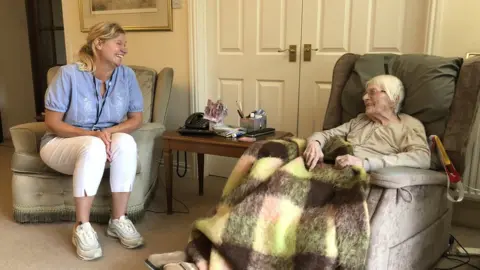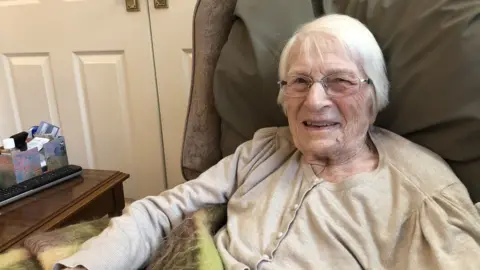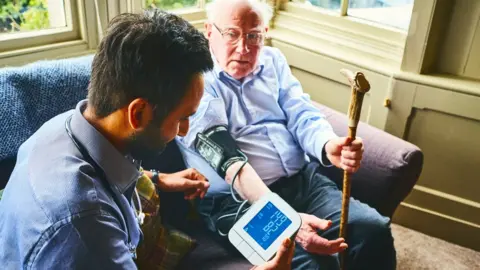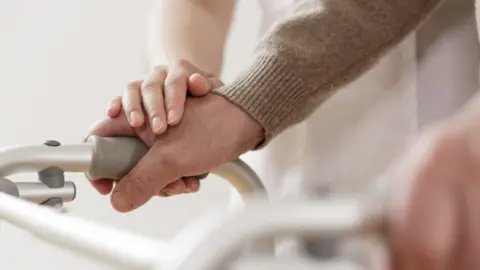More elderly to live at home in £14m Somerset Council savings plan
 BBC
BBCMore elderly and disabled people will be supported to live in their own homes as part of a £14m savings plan.
A new strategy for adult social care has been signed off by Somerset Council, using a consultancy firm costing £3.5m a year for two years.
It will focus on helping people to avoid hospital or residential care.
The council said it was the right approach for people needing care, as well as for saving money.
Challenged about whether this would mean less help for fewer people, director of adult services, Mel Lock said: "If you get the right thing for people, then money is saved."
Grace Rasch, from Wellington, recently turned 105. She celebrated this milestone birthday with family and friends, in her own home, sitting up in a chair.
Earlier this year she had spent weeks in bed when a decline in her health meant her live-in carers could no longer get her up safely.
"I was in bed for a long time," said Mrs Rasch.

Somerset Council community occupational therapist Amy Greening assessed Mrs Rasch and procured a hoist and reclining chair, training the carers in safe moving and handling.
"The chair meant Grace could be upright, be at eye-level with her family and not be a 'person in bed' which she had been for so long," said Ms Greening.
Mrs Rasch's nephew, Martyn Field, lives 180 miles away and visited for her recent birthday party.
"I can't express what a change it made," he said.
Families may do more
Mrs Rasch's case is textbook "reablement", Ms Lock said.
"It is about us working with our NHS primary care teams and GPs to understand when people start to wobble a little bit in their communities, or are staying in bed a bit longer, how together we can work out what we need to do, ask the individual, and make sure their needs are met," she added.
Ms Lock said the council had been heading in this direction for a while but it is now trying to "accelerate that change" to help people stay as independent as possible in their own homes.
"That's what people tell us they want," said Ms Lock.
"So what we're trying to do is make sure we have the right people and the right skills to help people to stay there."
 Getty Images
Getty ImagesAge UK Somerset said it has "sympathy" with Somerset Council and the "unprecedented demand they are experiencing in relation to Adult Social Care services".
It added that "there is no 'one size fits all' response" to the many complex care cases being seen.
"Indeed, our view has always been that a partnership approach between the public sector, the Voluntary, Community and Social Enterprise sector, and the many dedicated unpaid carers in Somerset is the way to successfully change the care landscape," it added.
As well as older adults, the council will also change the services offered to working-age people with physical or learning disabilities.
The council has been recruiting home carers from abroad to reduce waiting times for domiciliary care, but said there is still a problem attracting local people to care roles.
Ms Lock also said families may be asked to do more.
"Adult social care can't do this on our own," she said.
"It's absolutely key that we speak to our families, understand what they can do - and what they can't do - and speak to our neighbours and community organisations."
 Thinkstock
ThinkstockDirector of policy and public affairs at Carers UK, Emily Holzhausen OBE, said: "Having care closer to home is something that most families want, but there has to be a choice for families as this often means providing more care which can have a negative effect on their ability to have paid work, health, wellbeing and relationships.
"It's essential that there is extra investment in carers' and social care support to ensure that families are not put under even more pressure than they already are.
"As a priority we need more investment from central government to support councils to provide the amount of social care that individuals and families desperately need."
Ms Lock said Somerset is leading the way in many areas of how it delivers care and support.
"We want to continue to be at the forefront in the way we design our services - there is absolutely more we can do."

Follow BBC West on Facebook, Twitter and Instagram. Send your story ideas to: [email protected]
